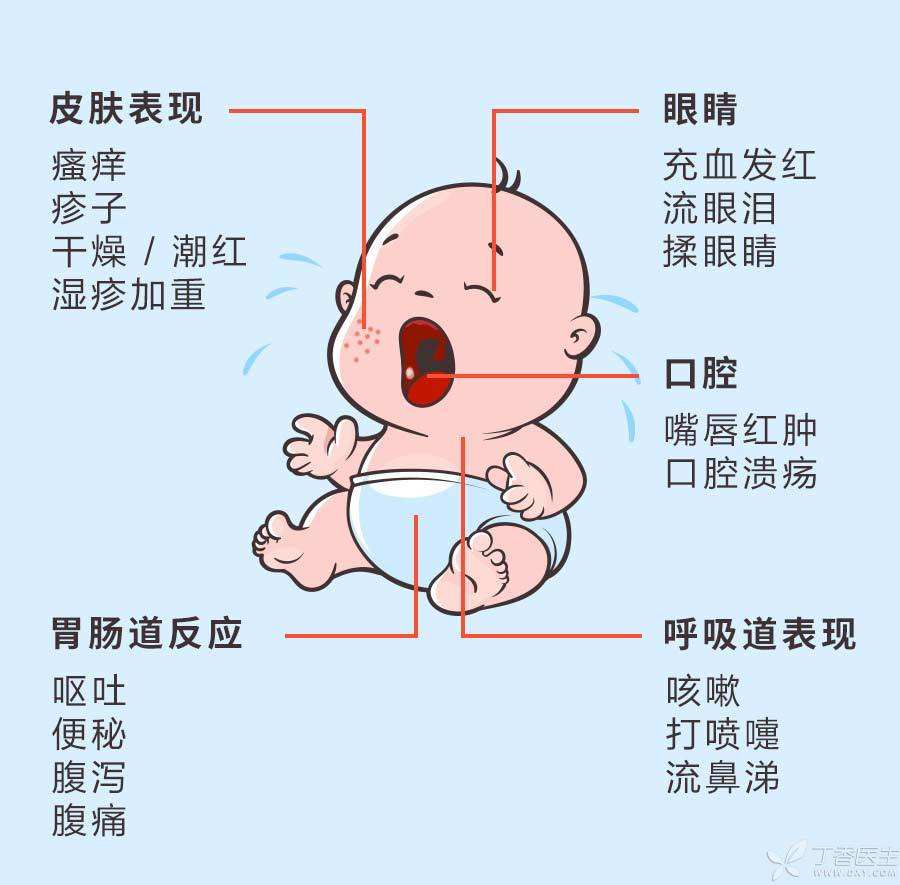
At present, there are many cases of infant food allergy. Although most allergic reactions are relatively mild and will not cause serious consequences, many children have lost the opportunity to eat rich and varied foods due to food allergy, which has had a noticeable impact on the quality of life and growth and development. Many parents know too little about children’s food allergy and treat children’s allergic reactions as other diseases. The effect is not good and children suffer. There are also a few children who will suffer from severe anaphylactic shock or even die.
The survey in 2009 showed that the prevalence rate of food allergy among children in Chongqing was about 7% ~ 9.2%. Food allergy is even more common among children in Europe and the United States. In the past 10 years, the prevalence rate of food allergy among children has increased by 18%.
Why are children prone to food allergy?
Statistics from the Allergy Clinic found that the patients with food allergy are mainly concentrated in children, especially infants under the age of 2. The main reasons for this situation are:
- Immature immune system: Children’s immune systems are not yet mature, It is more likely to develop allergy to foreign proteins (from protein components outside the body). Food ingredients are too complicated: The variety of food is getting richer and richer, Ingredients are becoming more and more complex, and there are many kinds of food flavoring agents and additives, such as various preservatives, pigments, preservatives, antioxidants, spices, etc., which will undoubtedly increase the probability of baby allergy. Genetic factors: if both parents or one of them has allergic diseases, the probability of baby food allergy will greatly increase.
Should what Suspect Food Allergy?
Parents should suspect that the baby may be allergic if the following manifestations and discomfort occur after taking some supplementary food.
- Skin pruritus: Erythema or rash of different sizes on the skin (mostly on the skin of the face, neck and ears), Some may have pimples similar to mosquito bites, Some show dry skin, flushing, It is also possible that the baby’s pre-existing eczema symptoms have worsened. Gastrointestinal reactions: Nausea, vomiting (such as frequent milk vomiting), abdominal pain (crying uneasiness), constipation, diarrhea, diarrhea, watery stool, etc. Oral cavity and eyes: The lips became red and swollen, the tongue festered, Babies will cry and refuse to eat. Some babies may show rubbing eyes, tears, eye congestion and redness of surrounding skin. Respiratory tract manifestations: Appears to resemble a cold, Always like to rub nose (nose itching), sneeze, runny nose, It is also possible to cough (paroxysmal dry cough, which is more obvious at night), shortness of breath, and even dyspnea (you must see a doctor in the hospital immediately). General situation: There are also babies who are more likely to cry, look like they have no spirit or strength, and always seem to want to sleep. Older children will say headache or show various emotional problems. For a long time, it may also be manifested as no weight gain or even weight loss, slow height growth, etc.
In case of the above situation, and excluding other factors such as colds and changes in family environment, one should be careful that the baby has allergy, especially those babies with family history of allergy.

What about baby food allergy?
Must be looking for a doctor.
- Avoid allergic foods: First of all, of course, we must stop eating allergic foods immediately. And related foods containing allergic food formulas. However, children with mild allergy should be reevaluated regularly. Do you need to continue to avoid this food? Symptomatic treatment: After the specialist confirmed that the baby had food allergy, According to the severity of the baby’s symptoms and the degree of physical damage, symptomatic treatment will be carried out. It must be reminded that: Parents cannot rely solely on allergen test results, You can judge whether your baby is allergic to food or not, Then strictly fast the baby, This will affect the growth and development of the baby. Generally, the negative or positive results of allergen examination are for reference only and need to be decided by a specialist through comprehensive judgment. Food substitution: If it is milk allergy, breast feeding should be continued, or milk powder with deep hydrolyzed protein formula or amino acid formula should be replaced according to the situation. Formulas such as soy protein or goat’s milk are not recommended, because 30% ~ 40% may be cross-allergic. Limiting the diet of lactating mothers: Does restricting the diet of lactating mothers affect the allergic symptoms of children? There is no obvious difference in statistics, but it is sometimes effective clinically and can be tried. Desensitization therapy is not recommended: at present, desensitization therapy is uncertain in efficacy and lacks safety, and is not recommended.
How to prevent and control food allergy?
Breastfeeding
Experts at home and abroad agree that exclusive breast-feeding is one of the effective methods to prevent infant food allergy. For infants with family history of allergy, it is recommended to insist on breast-feeding within one year old. Breast milk contains a variety of immunoglobulins, which is good for preventing allergy.
Be careful when adding supplementary foods.
-
Add it in time: not earlier than 17 weeks or later than 6 months, otherwise it may increase the risk of allergy.
-
Separate addition: When infants add new foods, they must add them separately as well, and avoid adding many new foods together.
-
Gradually increase the amount: when adding a new food, start from a small amount, which is convenient to observe whether the baby has allergic reaction;
-
Tentative addition: When trying new food for the baby, the baby usually refuses to eat and does not cooperate. This is the baby’s defensive instinct. You can stop feeding for about 3 days before trying to feed. If the baby has been refusing certain food, you should also consider the possibility of food allergy.
Cook thoroughly
The allergenicity of some foods will decrease after being heated and cooked.
Additive reduction
Try to avoid food containing preservatives, preservatives and other additives for your baby.
Write a food diary
Within the age of two, record the name and time of the new food added by the baby and compare it if necessary.
If you are allergic, you cannot eat it for life?
If the baby is definitely allergic to milk, it should first avoid milk and use other alternative milk sources, such as amino acid formula milk powder and hydrolyzed formula milk powder.
However, many parents may find that as the baby grows up slowly, after avoiding allergic food for a certain period of time (e.g. 3-4 years), they can gradually eat some once allergic food again and no longer have discomfort symptoms.
In fact, the baby to some food allergy can be [self-healing], this is because the body produces tolerance, such as milk. However, the allergy to seafood, peanuts and nuts may last for a lifetime. The mechanism of the different history of allergy is still unclear, and may be related to the gastrointestinal immune system.
If you want to determine whether you are still allergic to a certain food, you can review the allergen test every 1-2 years or so to assist in the judgment.
Which foods are susceptible to allergy?
There are thousands of kinds of food, most of which are allergenic. In 1999, the 23rd meeting of the International Codex Alimentarius Commission published a list of common allergenic foods. Eight types of highly allergenic foods worldwide are as follows:
- Milk, especially milk; Eggs, especially eggs; Fish, including marine fish and freshwater fish; Shellfish, such as shrimp, prawn, lobster, crab, clam, etc.; Peanuts; Soybean; Nuts, such as almonds, walnuts, cashew nuts, hazelnuts, pine nuts, chestnuts, etc.; Wheat.
At the same time, other sensitized foods are also announced, such as pork, beef, chicken, corn, tomato, carrot, celery, mushroom, garlic, sweet pepper, orange, pineapple, kiwi fruit, mustard and yeast.
The most common ones in our country are eggs, milk, cod, shrimp, crab, mutton, soybean, mushroom, cashew nuts, pistachios, mangoes, peaches, strawberries, corn, tomatoes, etc.
Responsible Editor: Xiaoyan
This article has passed the peer review of Dr. Clove Review Expert Committee. Clove Garden is all rights reserved and cannot be reproduced without permission.Source: 123rf.cn.com Genuine Picture Library
